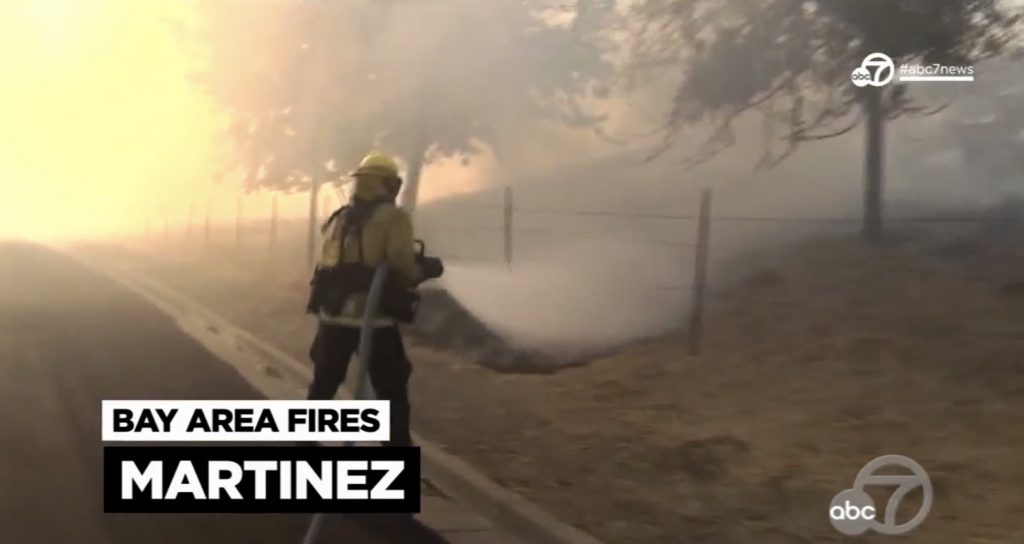 Sheriff’s Detectives investigate
Sheriff’s Detectives investigate
By Jimmy Lee, Director of Public Affairs, Contra Costa County Office of the Sheriff
On Thursday night, October 31, 2019, at about 10:50, Orinda Police Officers were dispatched to reports of a shooting at a residence on the 100 block of Lucille Way in Orinda.
Orinda officers, assisted by law enforcement officers from the area, arrived on scene and found a large house party with over 100 attendees.
There were three apparent gunshot victims who were pronounced deceased at the scene. Another died later at the hospital.
Other victims were taken to local hospitals by ambulance. The exact number is unknown as some victims transported themselves to the hospital.
A KTVU Fox2 News report gave the number of deceased victims at four, with a fourth having died at the hospital.
The Contra Costa County Office of the Sheriff Forensic Services Division Crime lab and Detectives from the Homicide Unit responded to the scene. The investigation is ongoing.
Anyone with any information on this case is asked to contact the Orinda Police Department or Office of the Sheriff at (925) 646-2441. The Investigation Division can be reached at (925) 313-2600. For any tips, email: tips@so.cccounty.us or call (866) 846-3592 to leave an anonymous voice message.
Allen Payton contributed to this report.
Read MoreResidents of cities in western and central parts of Contra Costa County – especially those with respiratory sensitivities like asthma – are urged to stay inside with windows and doors closed and limit outdoor activity due to poor air quality in the area.
Air quality in these areas have been measured at unhealthy levels this morning as a result of smoke from large fires burning in the region. (See ABC7 News report for video and list of fires). A health advisory issued last night for eastern parts of Contra Costa County has been lifted. Other areas in the county may be impacted by the smoke as wind conditions change.
People in the affected areas should avoid contact with the smoke and minimize any time spent outdoors, especially older adults, pregnant women, people who have asthma, lung or heart disease. People in the area should avoid going in and out of their homes in order to prevent bad air from getting indoors. For those without power, consider going to a location with a powered ventilation system.
Using a mask is not an effective substitute for staying indoors in a space with filtered air.
Common symptoms of smoke exposure include coughing, scratchy throat, headaches and irritated eyes, nose and throat. Contact your healthcare provider if you are concerned about these symptoms.
People with asthma should continue to follow their asthma plan, and those with chronic lung or heart disease should continue to take their medications regularly. Symptoms such as difficulty breathing, chest pain or chest tightness may require immediate medical attention. Call 911 if you experience these symptoms.
For the most up-to-date air quality maps, visit airnow.gov. More health information about wildfire smoke is available at cchealth.org/wildfire-smoke.
Read More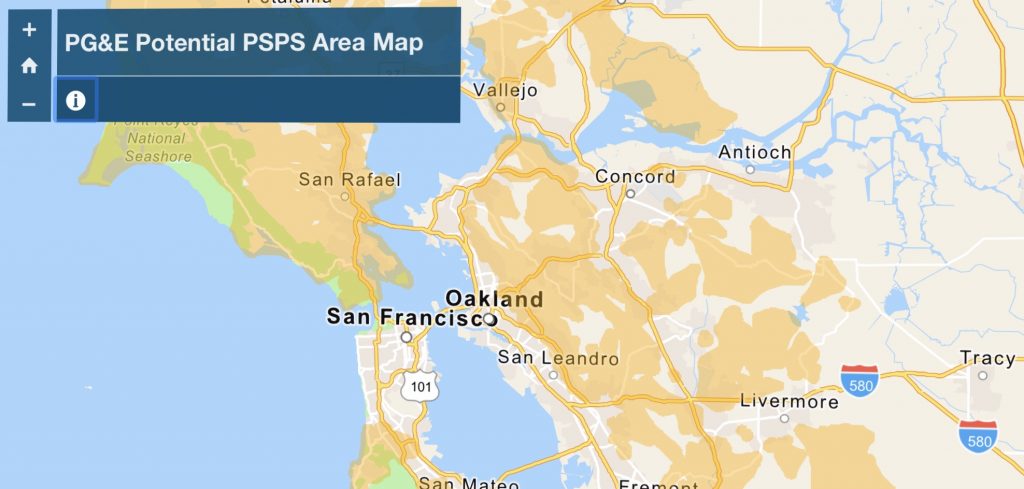
PG&E Potential PSPS Map as of 12:25PM 10-26-19
Customers Encouraged to Use Online Address Look-up Tool to Confirm If They Will Be Impacted
Historic Wind Event Forecast to Cause Dangerous Conditions Until Midday Monday
 SAN FRANCISCO, Calif. — Due to weather forecasts indicating potential for a historic wind event this weekend, Pacific Gas and Electric Company (PG&E) confirmed it will implement a Public Safety Power Shutoff (PSPS) affecting approximately 940,000 customers—an increase of about 90,000 from previous estimates—in portions of 36 counties. Widespread dry, hot and windy weather is expected to begin impacting the service area today between 6 p.m. and 10 p.m. and through midday Monday.
SAN FRANCISCO, Calif. — Due to weather forecasts indicating potential for a historic wind event this weekend, Pacific Gas and Electric Company (PG&E) confirmed it will implement a Public Safety Power Shutoff (PSPS) affecting approximately 940,000 customers—an increase of about 90,000 from previous estimates—in portions of 36 counties. Widespread dry, hot and windy weather is expected to begin impacting the service area today between 6 p.m. and 10 p.m. and through midday Monday.
As this weather system sweeps from north to south over a period of two to three days, PG&E customers across Northern and Central California will feel the effects of hot, dry winds at different times, which means outage times will vary as well.
Customers are encouraged to visit www.pge.com/eventmaps and use the address look up tool to confirm if they will be impacted by this PSPS event.
Power Will Be Turned Off in Phases
The PSPS will occur in six phases, times may change (earlier or later) dependent on weather. The first phase will begin about 2 p.m. on Saturday, October 26. Customer impacts will include these counties: Amador, Butte, Colusa, El Dorado, Glenn, Nevada, Placer, Plumas, San Joaquin, Sierra, Siskiyou, Shasta, Tehama and Yuba.
The second phase will occur around 4 p.m. on Saturday, October 26, impacting customers in the following counties: Lake, Marin, Mendocino (south), Napa, Solano, Sonoma and Yolo.
Phase three will begin about 5 p.m. Saturday, October 26, impacting customers in these counties: Alameda, Contra Costa, Monterey, San Benito, San Mateo, Santa Clara, Santa Cruz and Stanislaus.
Phase four will begin about 5 p.m. Saturday, October 26, impacting customers in these counties: Alpine, Calaveras, Mariposa and Tuolumne.
Phase five begin about 5 p.m. Saturday, October 26, impacting customers in these counties: Humboldt, Mendocino (north) and Trinity.
The sixth and final phase is scheduled to begin 10 a.m., Sunday, October 27, impacting customers in Kern County.
The power will be turned off to communities in stages, depending on local timing of the severe wind conditions.
OCTOBER 26 PSPS EVENT
The times below are estimates and may change (earlier or later) dependent on weather.
| PHASE | TIME/DATE | COUNTIES |
| 1 | 2 P.M. Saturday, Oct. 26 | Amador, Butte, Colusa, El Dorado, Glenn, Nevada, Placer, Plumas, San Joaquin, Sierra, Siskiyou, Shasta, Tehama, Yuba |
| 2 | 4 P.M. Saturday, Oct. 26 | Lake, Marin, Mendocino (south), Napa, Solano, Sonoma, Yolo |
| 3 | 5 P.M. Saturday, Oct. 26 | Alameda, Contra Costa, Monterey, San Benito, San Mateo, Santa Clara, Santa Cruz, Stanislaus |
| 4 | 5 P.M. Saturday, Oct. 26 | Alpine, Calaveras, Mariposa, Tuolumne |
| 5 | 5 P.M. Saturday, Oct. 26 | Humboldt, Mendocino (north), Trinity |
| 6 | 10 A.M. Sunday, Oct. 27 | Kern |
“This wind event is forecast to be the most serious weather situation that Northern and Central California has experienced in recent memory. We understand the widespread impacts this Public Safety Power Shutoff will have across Northern and Central California. We would only take this decision for one reason – to help reduce catastrophic wildfire risk to our customers and communities. There is no compromising the safety of our customers, which is our most important responsibility,” said Michael Lewis, PG&E’s senior vice president of Electric Operations
Customer Notifications and Impact
In most cases, the company has notified potentially impacted customers at 48 hours, 24 hours and just before the de-energization. However, customers not impacted by the PSPS, including those not within high fire-risk areas, may experience power outages due to PG&E equipment damaged during this major wind event. Those customers will not be notified in advance.
It is very possible customers may be affected by a power shutoff even though they are not experiencing extreme weather conditions in their specific location. This is because the electric system relies on power lines working together to provide electricity across cities, counties and regions.
The impacted counties, cities and communities are listed below. Customers can go to pge.com/pspsupdates to look up individual addresses to see if they are impacted by this event.
| Contra Costa | Total: 48,058
Medical Baseline: 1,584 |
Alamo, Antioch, Brentwood, Byron, Canyon, Clayton, Concord, Crockett, Danville, Diablo, El Cerrito, El Sobrante, Hercules, Kensington, Lafayette, Martinez, Moraga, Orinda, Pinole, Pittsburg, Pleasant Hill, Port Costa, Richmond, Rodeo, San Pablo, San Ramon, Walnut Creek |
Estimated Time of Restoration
Predictive data models indicate the weather event could be the most powerful to hit California in decades, with widespread dry northeast winds between 45-60 mph and peak gusts of 60-70 mph in the higher elevations.
Winds of this magnitude pose a higher risk of damage and sparks on the electric system and rapid wildfire spread. The fire risk is even higher because vegetation on the ground has been dried out by recent wind events.
Before restoring power, PG&E must inspect its equipment for damage and make any necessary repairs. That process cannot begin until the severe weather event has subsided.
Given the prolonged period during which the wind event will unfold, and the large number of power line miles that will need to be inspected before restoration, customers are being asked to prepare for an extended outage of at least two days once the severe weather has passed.
PG&E will work with state and local agencies to provide updated restoration timelines following the conclusion of the severe weather event.
Customer Resources
PG&E is opening 56 Community Resource Centers in areas where power will be shut off, and we are looking to add more. These centers will remain open in impacted areas throughout the PSPS to provide water, phone charging stations, air-conditioned seating for up to 100 people and restrooms. To view the current list, click here.
During the PSPS, customers in impacted areas will not be billed. PG&E has paused disconnection and collection activities in these areas.
Customers can visit pge.com/pspsupdates for more information.
How Customers Can Prepare
In addition, PG&E is asking customers to:
- Update your contact information by calling 1-866-743-6589. PG&E will use this information to alert customers through automated calls, texts, and emails, when possible, before and during a Public Safety Power Shutoff.
- Plan for medical needs like medications that require refrigeration or devices that need power.
- Identify backup charging methods for phones and keep hard copies of emergency numbers.
- Build or restock your emergency kit with flashlights, fresh batteries, first aid supplies and cash.
- Keep in mind family members who are elderly, younger children and pets.
- Learn more about wildfire risk and what to do before, during and after an emergency to keep your family safe at PG&E’s Safety Action Center.
While customers in high fire-threat areas are more likely to be affected by a Public Safety Power Shutoff event, any of PG&E’s more than five million electric customers could have their power shut off for safety because the energy system relies on power lines working together to provide electricity across cities, counties and regions.
Read More
Forecasts Indicate Potential for Historic Wind Event This Weekend
May Need to Proactively Turn Off Power for Safety in Portions of 36 Counties. Mutual Aid Request for 1,000 Personnel for Restoration Phase
10/25/19 7:34 PM UPDATE – According to Kristi Jourdan of PG&E’s Marketing and Communications, “The decision to proactively turn off power for safety has not yet been made – that is expected by 8 a.m. Saturday morning. We understand the impact turning off power for safety has on our customers, and we don’t take this action lightly.
If the decision is made to initiate a Public Safety Power Shutoff (PSPS), outages will begin approximately 7 p.m., Saturday in the Bay Area/Cost/S. Sierra Foothills regions. This includes Contra Costa County. We do our best to provide approximate timeframes to indicate when shutoffs are expected, but some areas may experience power outages before or after the expected shutoff times.
It’s important to note that as this weather system sweeps from north to south over a period of two days, PG&E customers across Northern and Central California will feel the effects of hot, dry winds at different times, which means outage times will vary as well. As this intense weather event approaches the service area in the next 24 hours, PG&E’s forecasts will offer sharper detail, noting that the scope may continue to change on the number of customers who will be affected.
Conditions can change quickly, so we ask that customers please stay prepared with their emergency plan. We will continue to monitor conditions and update customers by phone, text and email. You can also follow us on social media. The latest information and maps are at pge.com/pspsupdates.”
SAN FRANCISCO (Friday, October 25, 2019) – Pacific Gas and Electric Company (PG&E) today said it continues to monitor a potentially powerful and widespread dry, hot and windy weather event expected to begin impacting the service area Saturday between 6 and 10 p.m. and lasting until midday Monday.
PG&E will need to turn off power for safety several hours before the potentially damaging winds arrive. It’s important to note that as this weather system sweeps from north to south over a period of two days, PG&E customers across Northern and Central California will feel the effects of hot, dry winds at different times, which means outage times will vary, as well.
The potential Public Safety Power Shutoff (PSPS) is expected to affect approximately 850,000 customers and may impact portions of 36 counties across portions of Humboldt, the Sierra foothills, Western Sacramento Valley, North Bay, and across the greater Bay area, Monterey Bay and northern Central Coast on Saturday, Oct. 26. Customers in the southern-most portion of PG&E’s service area in Kern County could have power shut off for safety on Sunday, Oct. 27.
Predictive data models indicate the weather event could be the most powerful in California in decades, with widespread dry Northeast winds between 45-60 miles per hour (mph) and peak gusts of 60-70 mph in the higher elevations.
Winds of this magnitude pose a higher risk of damage and sparks on the electric system and rapid wildfire spread. The fire risk is even higher because vegetation on the ground has been dried out by recent wind events.
Given the forecast and conditions, PG&E is advising its customers of the potential for a widespread PSPS lasting several days, intended to prevent a catastrophic wildfire. As this intense weather event approaches the service area in the next 24 hours, PG&E’s forecasts will offer sharper detail, noting that the scope may continue to change on the number of customers who will be affected.
Counties Potentially Impacted
| County | Customers | Cities or unincorporated areas with some customers potentially impacted |
| Alameda | Total: 57,360
Medical Baseline: 1,302 |
Albany, Berkeley, Canyon, Castro Valley
Dublin, Fremont, Hayward, Livermore Oakland, Piedmont, Pleasanton, San Leandro, Sunol |
| Alpine | Total: 66
Medical Baseline: 0 |
Bear Valley |
| Amador | Total: 19,909
Medical Baseline: 974 |
Amador City, Drytown, Fiddletown, Ione, Jackson, Martell, Pine Grove, Pioneer, Plymouth, River Pines, Sutter Creek, Volcano |
| Butte | Total: 19,152
Medical Baseline: 1,398 |
Bangor, Berry Creek, Brush Creek, Butte Meadows, Chico, Clipper Mills, Cohasset, Feather Falls, Forbestown, Forest Ranch, Magalia, Oroville, Palermo, Paradise, Rackerby, Stirling City, Yankee Hill |
| Calaveras | Total: 30,396
Medical Baseline: 1,370 |
Angels Camp, Arnold, Avery, Burson, Camp Connell, Campo Seco, Copperopolis, Dorrington, Douglas Flat, Glencoe, Hathaway Pines, Mokelumne Hill, Mountain Ranch, Murphys, Rail Road Flat, San Andreas, Sheep Ranch, Tamarack, Vallecito, Valley Springs, Wallace, West Point, White Pines, Wilseyville |
| Colusa | Total: 64
Medical Baseline: 2 |
Arbuckle, Maxwell, Sites, Williams |
| Contra Costa | Total: 48,824
Medical Baseline: 1,610 |
Alamo, Antioch, Brentwood, Byron, Canyon, Clayton, Concord, Crockett, Danville, Diablo, El Cerrito, El Sobrante, Hercules, Kensington, Knightsen, Lafayette, Martinez, Moraga, Orinda, Pinole, Pittsburg, Pleasant Hill, Port Costa, Richmond, Rodeo, San Pablo, San Ramon, Walnut Creek |
| El Dorado | Total: 56,643
Medical Baseline: 2,774 |
Cameron Park, Camino, Cold Springs, Coloma, Cool, Diamond Springs, El Dorado Hills, Fair Play, Garden Valley, Georgetown
Greenwood, Grizzly Flats, Kelsey, Kyburz, Lotus, Mount Aukum, Pacific House, Pilot Hill, Placerville, Pollock Pines, Rescue, Shingle Springs, Somerset, Twin Bridges |
| Glenn
|
Total: 43
Medical Baseline: 2 |
Orland, Willows |
| Humboldt | Total: 64,710
Medical Baseline: 2,057 |
Alderpoint, Alton, Arcata, Bayside, Blocksburg
Blue Lake, Bridgeville, Carlotta, Eureka, Fernbridge, Ferndale, Fieldbrook, Fields, Landing, Fortuna, Garberville, Honeydew, Hoopa, Hydesville, Kneeland, Korbel, Loleta Manila, Mckinleyville, Miranda, Myers Flat, Orick, Orleans, Phillipsville, Redcrest, Rio Dell, Samoa, Scotia, Trinidad, Weitchpec, Weott, Willow Creek |
| Kern | Total: 842
Medical Baseline: 27 |
Arvin, Bakersfield, Lebec, Grapevine |
| Lake | Total: 37,441
Medical Baseline: 2,170 |
Clearlake, Clearlake Oaks, Clearlake Park, Cobb, Finley, Glenhaven, Hidden Valley Lake, Kelseyville, Lakeport, Loch Lomond, Lower Lake, Lucerne, Middletown, Nice, Upper Lake, Witter Springs |
| Marin | Total: 86,813
Medical Baseline: 1,574 |
Belvedere, Bolinas, Corte Madera, Dillon Beach, Fairfax, Fallon, Forest Knolls, Greenbrae, Inverness, Kentfield, Lagunitas, Larkspur, Marshall, Mill Valley, Muir Beach, Nicasio, Novato, Olema, Point Reyes Station, Ross, San Anselmo, San Geronimo, San Rafael, Sausalito, Stinson Beach, Tiburon, Tomales, Woodacre |
| Mariposa | Total: 809
Medical Baseline: 42 |
Coulterville, Greeley Hill |
| Mendocino | Total: 12,755
Medical Baseline: 408 |
Albion, Boonville, Branscomb, Cummings, Dos Rios, Elk, Gualala, Hopland, Laytonville, Leggett, Little River, Manchester, Philo, Piercy, Point Arena, Potter Valley, Redwood Valley, Ukiah, Westport, Willits, Yorkville |
| Monterey | Total: 993
Medical Baseline: 49 |
Aromas, Salinas |
| Napa | Total: 11,294
Medical Baseline: 248 |
Angwin, Calistoga, Deer Park, Lake Berryessa, Oakville, Pope Valley, Rutherford, St Helena, Yountville |
| Nevada | Total: 43,211
Medical Baseline: 1,822 |
Chicago Park, Grass Valley, Nevada City, Norden, North San Juan, Penn Valley, Rough And Ready, Smartsville, Soda Springs, Washington |
| Placer | Total: 31,277
Medical Baseline: 1,275 |
Alta, Applegate, Auburn, Baxter, Emigrant Gap, Foresthill, Gold Run, Granite Bay, Loomis, Meadow Vista, Newcastle, Penryn, Weimar |
| Plumas | Total: 785
Medical Baseline: 6 |
Belden, La Porte, Quincy, Storrie, Twain |
| San Benito | Total: 1,369
Medical Baseline: 39 |
Aromas, Hollister, San Juan Bautista |
| San Joaquin | Total: 372
Medical Baseline: 5 |
Linden |
| San Mateo | Total: 64,932
Medical Baseline: 1,293 |
Belmont, Burlingame, Daly City, El Granada, Emerald Hills, Half Moon Bay, Hillsborough, La Honda, Loma Mar, Montara, Moss Beach, Pacifica, Pescadero, Portola Valley, Redwood City, San Bruno, San Carlos, San Gregorio, San Mateo, South San Francisco, Woodside, Unincorporated Communities in Southwest San Mateo County |
| Santa Clara | Total: 27,093
Medical Baseline: 823 |
Coyote, Cupertino, Gilroy, Los Altos, Los Altos Hills, Los Gatos, Monte Sereno, Morgan Hill, Redwood Estates, San Jose, San Martin |
| Santa Cruz | Total: 44,945
Medical Baseline: 2,095 |
Aptos, Ben Lomond, Brookdale, Capitola, Corralitos, Felton, Freedom, La Selva Beach, Mount Hermon, Santa Cruz, Scotts Valley, Soquel |
| Shasta | Total: 28,460
Medical Baseline: 1,663 |
Anderson, Bella Vista, Big Bend, Cottonwood, French Gulch, Igo, Lakehead, Millville, Montgomery Creek, Oak Run, Ono, Palo Cedro, Platina, Round Mountain, Shingletown, Whiskeytown, Whitmore |
| Sierra | Total: 1,159
Medical Baseline: 14 |
Alleghany, Downieville, Goodyears Bar, Pike City, Sierra City |
| Siskiyou | Total: 51
Medical Baseline: 0 |
Somes Bar |
| Solano | Total: 10,232
Medical Baseline: 545 |
Fairfield, Suisun City, Vacaville, Vallejo |
| Sonoma | Total: 92,877
Medical Baseline: 2,695 |
Annapolis, Bodega, Bodega Bay, Camp Meeker, Cazadero, Cloverdale, Cotati, Duncans Mills, Forestville, Freestone, Geyserville, Glen Ellen, Graton, Guerneville, Healdsburg, Jenner, Kenwood, Larkfield, Monte Rio, Occidental, Penngrove, Petaluma, Rio Nido, Rohnert Park, Sebastopol, Stewarts Point, Valley Ford, Villa Grande, Windsor |
| Stanislaus | Total: 163
Medical Baseline: 2 |
Knights Ferry, Oakdale, Patterson, Westley |
| Tehama | Total: 19,238
Medical Baseline: 1,218 |
Corning, Flournoy, Gerber, Los Molinos, Manton, Mill Creek, Mineral, Paskenta, Paynes Creek, Proberta, Red Bluff, Vina |
| Trinity | Total: 1,046
Medical Baseline: 39 |
Del Loma, Hawkins Bar |
| Tuolumne | Total: 29,454
Medical Baseline: 1,476 |
Big Oak Flat, Chinese Camp, Columbia, Groveland, Jamestown, Long Barn, Mi Wuk Village, Pinecrest, Sonora, Soulsbyville, Strawberry, Twain Harte |
| Yolo | Total: 530
Medical Baseline: 15 |
Brooks, Capay, Esparto, Guinda, Rumsey, Winters |
| Yuba | Total: 5,502
Medical Baseline: 313 |
Browns Valley, Camptonville, Dobbins, Loma Rica, Oregon House, Strawberry Valley, Wheatland |
Shutoffs Could be Widespread and Extended
As experienced earlier in October, portions of most counties in PG&E’s 70,000-square-mile service area could be temporarily de-energized, potentially including all Tier 2 and Tier 3 fire risk regions. Customers can view the fire threat maps on the California Public Utilities Commission website to know whether they live in one of these high fire-risk regions.
Customers should prepare for a shutoff lasting 48 hours or longer, given the long duration of the wind event. Power cannot be restored until the dangerous weather has passed, safety inspections of de-energized lines are complete, and damage to the system has been repaired.
“We understand that a longer shutoff would be very difficult for our customers. We are already working to minimize the length, including amassing a force of field personnel from PG&E, plus contractors and other utility companies, to be ready to tackle the inspection, repair and restoration process as soon as the weather passes,” said PG&E Corporation CEO and President Bill Johnson.
Customer Notifications
The company provides direct notifications to affected customers who have given their contact information to PG&E 48 hours in advance of the potential shutoff, and again at 24 hours and four hours before shutoff.
PG&E has not determined whether to move forward with a shutoff, but will continue to monitor weather conditions and provide more definitive information on the potential timing and scale of shutoffs as weather models are updated.
Forecasts and Criteria for Shutoff
“The upcoming wind event has the potential to be one of the strongest in the last several years. It’s also likely to be longer than recent wind events, which have lasted about 12 hours or less,” said Scott Strenfel, Principal Meteorologist with PG&E.
PG&E’s meteorology team is part of a group of fire weather experts and data scientists at the company who work closely with the National Weather Service and the National Interagency Fire Center’s (NIFC) Geographic Area Coordination Center.
The company carefully reviews a combination of many criteria before taking steps to shut off power for safety, including but not limited to:
- Low humidity levels, generally 20 percent and below.
- Forecasted sustained winds generally above 25 mph and wind gusts in excess of approximately 45 mph, depending on location and site-specific conditions such as temperature, terrain, vegetation and local climate.
- Moisture content: Condition of dry fuel on the ground and live vegetation (dead and live fuel moistures).
- On-the-ground, real-time observations from PG&E’s Wildfire Safety Operations Center and field crews.
- A Red Flag Warning declared by the National Weather Service.
- Information from the NIFC and National Weather Service, including high risk days and locations considered “critical burn environments.”
Working to Minimize the Shutoffs
To help speed inspections and repairs, the company has requested mutual aid of 1,000 workers from other energy companies, including ATCO Energy in Alberta, Xcel Energy in Minnesota and Florida Power & Light. These crews are expected to be staged and briefed on the restoration plan by Sunday evening. If weather progresses as expected, restoration could begin in some portions of the affected area as early as Monday afternoon.
The company and its mutual aid partners will prioritize areas that can be safety restored to bring the maximum number of customers back online as quickly as possible.
PG&E is also working to minimize customer impact wherever possible through a combination of sectionalizing the grid and providing emergency backup power generation resources that will be able to quickly re-energize customers in portions of some cities.
How Customers Can Prepare
As part of PSPS preparedness efforts, PG&E is asking customers to:
- Update their contact information by calling 1-866-743-6589 during normal business hours. PG&E will use this information to alert customers through automated calls, texts, and emails, when possible, prior to, and during, a Public Safety Power Shutoff.
- Plan for medical needs like medications that require refrigeration or devices that need power.
- Identify backup charging methods for phones and keep hard copies of emergency numbers.
- Build or restock your emergency kit with flashlights, fresh batteries, first aid supplies and cash.
- Keep in mind family members who are elderly, younger children and pets.
- Learn more about wildfire risk and what to do before, during and after an emergency to keep your family safe at PG&E’s Safety Action Center.
To support customers in the affected areas, PG&E will open Community Resource Centers which provide restrooms, bottled water, electronic device charging and air-conditioned seating. Mobile resource stations (vans), when available, will provide bottled water, phone-charging and latest information for customers. PG&E is working with counties and cities on locations and will provide the list including operating hours prior to initiating the PSPS.
About PG&E
Pacific Gas and Electric Company, a subsidiary of PG&E Corporation (NYSE:PCG), is one of the largest combined natural gas and electric energy companies in the United States. Based in San Francisco, with more than 20,000 employees, the company delivers some of the nation’s cleanest energy to 16 million people in Northern and Central California. For more information, visit www.pge.com and www.pge.com/news.
Allen Payton contributed to this report.
Read More By Susan Shiu, Director, Contra Costa County Office of Communications and Media
By Susan Shiu, Director, Contra Costa County Office of Communications and Media
Contra Costa County is preparing to respond to the impacts of a confirmed PG&E power shutoff event affecting parts of the County. PG&E’s Public Safety Power Shutoff (PSPS) is expected to start 10:00 pm on Saturday, October 26th, through Monday, October 28th afternoon. According to PG&E, complete power restoration may take several days. The County’s Emergency Operations Center plans a Level 2 Partial Activation starting at 6 pm on Saturday, October 26th.
PG&E estimates that 48,000 customers in Contra Costa County could lose power. We expect the shutoff to impact over 120,000 residents in the County. The PG&E power shutoff event will affect large areas of the County, including Alamo, Antioch, Brentwood, Byron, Canyon, Clayton, Concord, Crockett, Danville, Diablo, El Cerrito, El Sobrante, Hercules, Kensington, Knightsen, Lafayette, Martinez, Moraga, Oakley, Orinda, Pinole, Pittsburg, Pleasant Hill, Port Costa, Richmond, Rodeo, San Pablo, San Ramon and Walnut Creek. PG&E expects to start restoring power on Monday, October 28th, in the afternoon with complete restoration possibly taking several days.
 “We urge residents to prepare for this event. Our staff is diligently planning a response to the effects of this event,” said Board Chair, Supervisor, John Gioia. “We remind residents the decision to shut off and restore power has been planned and managed solely by PG&E.”
“We urge residents to prepare for this event. Our staff is diligently planning a response to the effects of this event,” said Board Chair, Supervisor, John Gioia. “We remind residents the decision to shut off and restore power has been planned and managed solely by PG&E.”
Contra Costa County is working to ensure that the public is aware of this PG&E power shutoff event. The County has also been working to ensure that we are ready with our operations and response to this PG&E power shutoff.
Go to Contra Costa County’s website at www.contracosta.ca.gov for updates, a PG&E map of impacted areas, and ways to prepare before, during and after a power outage. Check www.pge.com to register for wildfire alerts and for customer updates.
Read More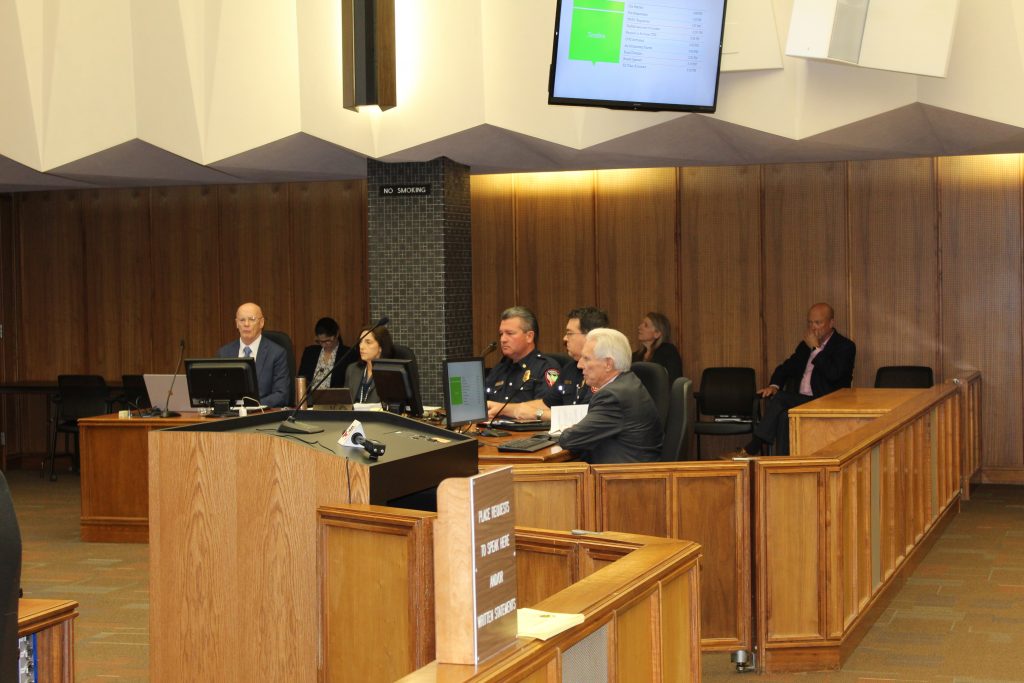
The Contra Costa County Board of Supervisors conducted a hearing on Tuesday to learn from county fire and hazardous materials officials what may have caused the Oct. 15 fire that caused the destruction of 250,000 gallons of ethanol, a chemical mixed with gasoline At the meeting were from left County Administrator David Twa, Contra Costa County Assistant Counsel Mary Ann Mason, Contra Costa County Fire Protection District Deputy Fire Chief Aaron McAllister, CCCFPD Fire Chief Lewis Broschard, and Contra Costa County Hazardous Materials Program Director Randy Sawyer. Photos by Daniel Borsuk.
Form committee to consider half-cent sales tax measure for Nov. 2020 ballot
By Daniel Borsuk
Contra Costa County Supervisors on Tuesday demanded that county officials confirm that operators of the fire damaged NuStar Energy plant in Crockett not resume operations until its fire and hazardous materials safety measures have been completely reviewed and upgraded by state and federal authorities.
“I want updated progress reports on your investigations,” demanded Board Chair John Gioia, whose District 1 covers the Crockett refinery location where the fire erupted from a tank filled with ethanol at 1:45 p.m. on Tuesday, October 15. The fire spread, catching a nearby tank also containing ethanol. Some 250,000 gallons of ethanol were destroyed in the fire.
The blaze forced county authorities to call a Shelter in Place in the Crockett area. Interstate 80 was closed for six hours. The incident was officially over at 8:10 p.m. when I-80 was reopened to traffic by the Highway Patrol, said Contra Costa County Director of Hazardous Materials Randy Sawyer.
“At the end of the day, the incident was contained, “said Contra Costa County Fire Protection District Chief Lewis Broschard. “No other tanks were destroyed. No other materials were discharged.”
Broschard told supervisors it was through the fire fighting resources of NuStar Energy and several other refineries that were able to promptly respond to the fire site to assist CCCFPD in extinguishing fire. Those refineries – Shell, Chevon, Phillips 66, Tessoro, and Marathon – supplied foam that the county fire district did not have to adequately extinguish the blaze, said Chief Broschard.
Chief Broschard said at this time there is no known cause for the fire including whether arson may have been a factor.
Gioia made it clear to Contra Costa County Fire Protection District Chief Broschard and Contra Costa County Hazardous Materials Program Director Randy Sawyer that he wants a thorough investigation completed before “there is a reopening” of the NuStar plant.
Supervisors heard from eight speakers, all critical of NuStar and its safety track record.
NuStar spokesperson Mary Rose Brown told the Contra Costa Herald via an emailed message:
“We absolutely agree, and we are working closely and cooperatively with CalOSHA and other regulatory agencies on detailed plans to ensure that the facility is safe to operate before it is reopened. We also are continuing to work in very close cooperation with all applicable local and state regulatory agencies to investigate the root cause of the incident so that we can take whatever measures are required to ensure the continued safety of our employees, contractors, neighbors and the community. We worked over the weekend to pump liquids out of the incident area and CalOSHA and local fire investigators accessed the area today (Tuesday).”
County resident Carl Davidson suggested that the NuStar plant incident may have been triggered by a seismic event since the facility is located on the Pinole fault and the fire erupted after seismic events were reported in the Pleasant Hill area the previous day.
Twenty-five-year Crockett area resident Isabella Izzi said the board of supervisors and regulators should clamp down on NuStar for this environmental violation and future violations by requiring the refiner to provide hazmat masks to all residents of Crockett. “The Board of Supervisors should make it clear that it will deny any new expansion at that refinery,” she said.
Dan Torres, a representative of an industrial fire sprinkler installation union, questioned the quality and reliability of the fire sprinkler system installed at NuStar.
At the end, Chair Gioia asked that updates on the NuStar fire will be reported at the Public Safety Committee that he chairs.
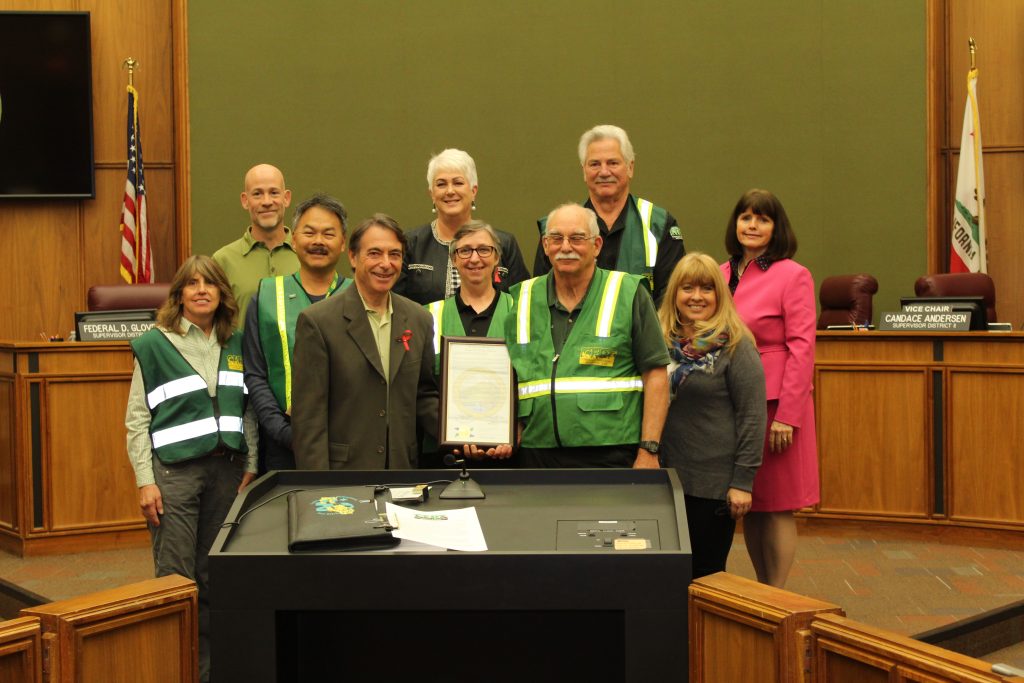
The Contra Costa County Board of Supervisors recognized the community service of CERT C-8 on Tuesday. Currently consisting of 70 members, supervisors recognized the organization that is known to dispatch volunteers to train senior care staff, serve as Amateur Radio Operators, Red Cross Shelter workers, traffic control and join the Contra Costa CART. C-8 has helped to get Spanish Cert out to many areas of the county. The program is called Listos.
Sales Tax Ad Hoc Committee Formed
Supervisors voted 4-0 to create an ad hoc committee to explore the feasibility of placing on the ballot a sales tax measure. The committee will consist mainly of union leaders, county agency heads and nonprofit organizations leaders.
On the vote, District 5 Supervisor Federal Glover was absent.
At the recommendation of District 4 Supervisor Karen Mitchoff, who serves on the Finance Committee, proposed the establishment of a citizen-based ad hoc committee to study a proposal that could wind up on a ballot for county voters to decide on perhaps by the November 2020 general election.
In California, the maximum sales, use, and transactions tax rate is 9.25 percent. That includes a statewide base sale and use tax of 7.25 percent and up to 2 percent for local district transaction and use taxes.
Current projections for annual revenues for a countywide transaction and use tax are one half cent $93 million and quarter cent $46.5 million. Current projections for annual revenues for an unincorporated area transaction and use tax are one half cent: $8.32 million and one.
So far, the ad hoc committee will study several potential tax scenarios. Current projections for annual revenues for a countywide transaction and use tax area:
. 0.50 percent (1/2 cent): $93 million
. 0.25 percent (1/4 cent): $46.5 million
Projections for annual revenues for an unincorporated area transaction and use tax are:
. 0.50 percent (1/2 cent): $8.32 million
. 0.25 percent (1/4 cent): $4.16 million
Mitchoff said she is promoting the sales tax ad hoc committee because she frequently hears from constituents why Contra Costa County does not have a sales tax while other counties like Alameda, San San Mateo, Santa Clara and others do draw additional revenues for county services from a sales tax.
The ad hoc committee will be led by stake holders, not supervisors, Mitchoff said. “We want all comers at the table,” she said. “This will be a difficult lift.”
“This is a huge opportunity,” said Sean Casey, executive director of the nonprofit organization First 5. “16,000 families could benefit from this in Contra Costa County.”
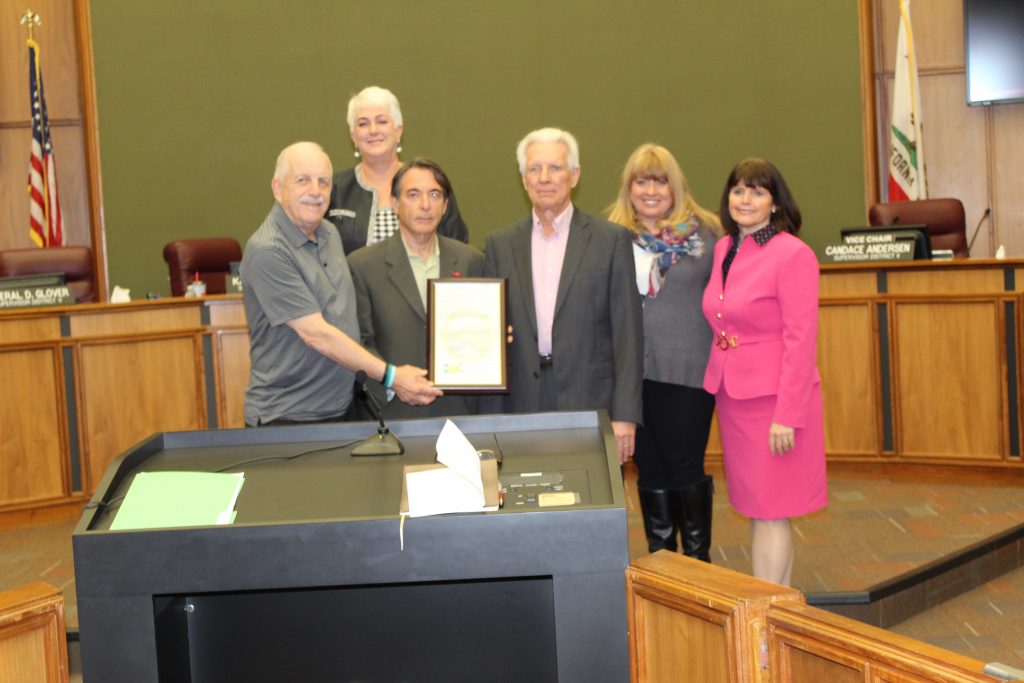
The Contra Costa County Board of Supervisors designated November 6 as ”Shelter-in-Place-Education Day” in all public and private schools and children centers in the county. The Contra Costa Community Awareness Emergency Response Group – CAER – is sponsoring the 18th Annual Shelter-in-Place Drill and assisting schools and childcare centers with their emergency preparedness. At the resolution presentation during the board’s Tuesday meeting were from left REACHProject Executive Director Mickie Marchetti, District 4 Supervisor Karen Mitchoff, Board Chair John Gioia, Contra Costa County Hazardous Materials Program Director Randy Sawyer, District 3 Supervisor Diane Burgis, and Vice Chair Candace Andersen.
In other business, the supervisors:
-Approved a $240,000 contract to Concord Yellow Cab, Inc. to provide non-emergency taxicab transportation services for Contra Costa Regional Medical center and Contra Costa Health Center patients for the period July 1, 2019 through June 30, 2020. The county pays taxicab service for patients unable to transport themselves to medical appointments due to medical conditions, including physical disabilities, patients who have verifiable seizure disorder or patients who have received medications which has or could impair their mobility.
-Approved a $1.97 million Public Works Department contract with Debri-Tech, Inc. to provide on-call assistance with trash and abandoned waste cleanup and removal for the Contra Costa County Watershed Program for the program October 15, 2019 through September 30, 2022.
-Approved the issuance of $85 million in Multifamily Housing Revenue Bond by the California Statewide Communities Development Authority for the Fairfield Hilltop LP, a California limited partnership, to provide for the financing of the acquisition and rehabilitation of a 322-unit multi-family housing development known as Hilltop Commons Apartments located at 15690l Crestwood Drive.
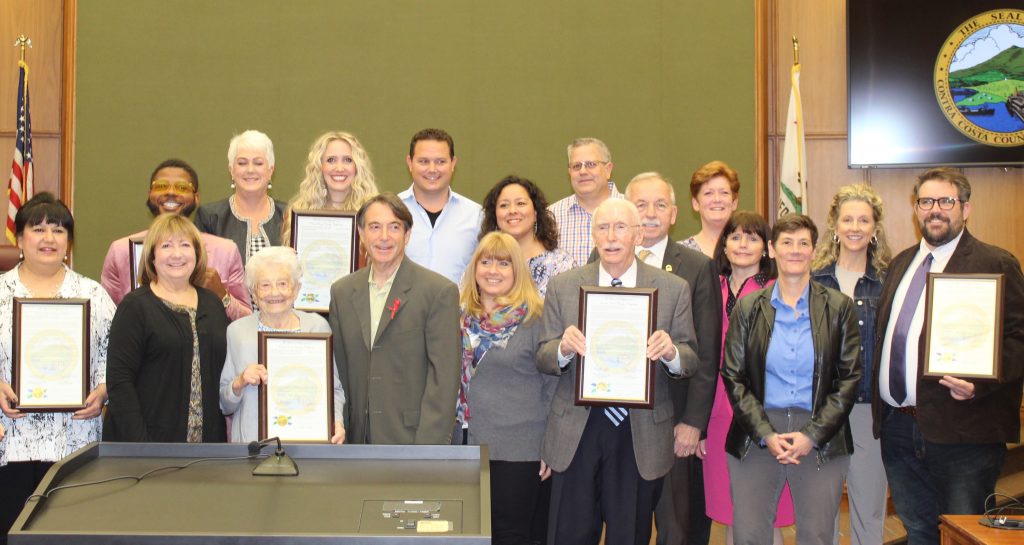
Some of the county’s major figures in the arts were honored by the Contra Costa County Board of Supervisors on Tuesday. Supervisors presented Awards for Outstanding Contributions to the Arts. Supervisors recognized the Lafayette Town Hall Theater for reaching a milestone celebrating its 75th anniversary and 300th theatre production. The theater’s theater and dance education programs serve 600 families each year. The Blue Devil Performing Arts, founded by Tony and Ann Odello in 1957, was recognized for serving more than 6,000 young persons during a long celebrated history. The Blue Devil Performing Arts, founded as a Drum Corps with a separate marching team, but later added glockenspiels (bells), Color Guard and horns to their productions was undefeated State Champion drum and Bell Corps from 1957 to 1970. The majorettes earned six National Championships and 12 National Team titles. Supervisors also honored Michelle Seville, who is retiring after 12 years as manager of Richmond’s Arts & Culture Center. Seveille was one of the original park rangers at the Rosie the Riveter National Historical Park when it was first established in 2000.
 By Brentwood Police Department
By Brentwood Police Department
On Friday night/Saturday morning, October 19, 2019, at around 12:04 a.m., Brentwood officers responded to the In-N-Out Burger parking lot located at 5581 Lone Tree Way to investigate a shooting. When officers arrived on scene, they quickly learned two victims (19- and 16-year-old males) were struck by gunfire in a drive-by shooting. When the shooting occurred, both victims were standing amongst a group people in the parking lot on the west side of the restaurant. Both victims were taken to area hospitals and are expected to survive their gunshot wounds.
The suspect vehicle was described as a silver, 2017 or newer, Honda Accord sedan with rear tinted windows. The suspect vehicle was last seen traveling eastbound on Lone Tree Way towards Canada Valley Road. The shooting happened so quickly nobody could provide a suspect(s) description.
The restaurant was struck by two bullets, but thankfully no customers or employees were hit.
Preliminary information suggests this was not a random act, but the motive is still unclear.
This investigation is still ongoing and no additional details are being released at this time.
Anyone with information regarding this shooting is encouraged to call Detective Joe Nunemaker at 925-809-7761. Callers can remain anonymous.
Read More By Jimmy Lee, Director of Public Affairs, Contra Costa County Office of the Sheriff
By Jimmy Lee, Director of Public Affairs, Contra Costa County Office of the Sheriff
Thursday morning, Oct. 17, 2019 at about 10:45, Bay Station Deputy Sheriffs were dispatched to the train tracks near Parr Boulevard and Giant Road in North Richmond regarding a found male body.
The Richmond Police Department was already on scene. It was initially believed the man died after being struck by a train. As this occurred in Sheriff’s Office jurisdiction, Deputies began an investigation. They noticed the man suffered from a gunshot wound.
Detectives from the Homicide Unit and the Forensic Services Division Crime Lab responded to the scene.
The victim is identified as 40-year-old William Cody Tate of San Pablo. On Friday, October 18, 2019, an autopsy was conducted to determine the cause of death. The Forensic Pathologist found no evidence of a gunshot wound. The cause of death for Tate is listed as blunt force trauma and the injuries are consistent with being struck by a train.
This case is still under investigation.
Anyone with any information on this case is asked to contact the Office of the Sheriff at (925) 646-2441 or Investigation Division at (925) 313-2600. For any tips, email: tips@so.cccounty.us or call (866) 846-3592 to leave an anonymous voice message.
Read MoreSunday, Oct. 20 11 AM – 4 PM
Marina Event Center, 200 Marina Blvd, Pittsburg, California 94565
For more information visit https://www.facebook.com/events/1410042409136547/
Read MoreBy Don Martin II
Antioch, CA…This weekend Antioch Speedway will be hosting the biggest Dirt Modified race of the year. It’s the First Annual West Coast Nationals. The A Modifieds and the B Modifieds will both be competing.
Past Modified and Stock Car competitor Chad Chadwick is making his foray into promoting with this big event. He’s hoping not just to offer the racers a big money race, but also to help reclaim Antioch Speedway’s status as one of the top tier dirt tracks in the state. “The fans will be seeing some of the best Modified racing you’ll find anywhere,” said Chadwick. “Some of the best drivers on the West Coast will be here this weekend. We have a format that will give the racers several opportunities to make it into the big race. I’m excited to be bringing this race to Antioch Speedway.”

Bobby Hogge IV #2h will be one of the drivers to beat in the West Coast Nationals at Antioch Speedway. Photo by Kniss Racing Photos.
The event kicks off on Thursday night with a practice, barbecue, cornhole tournament and live music. Both divisions will compete in heat races and Preliminary Features on Friday. The Top 4 finishers in the Preliminary Features will be locked into Saturday’s big money Main Event.
On Saturday, the two divisions will again run heat races as well as B Mains and Last Chance Qualifiers. The night ends with the Main Events offering purses of $25,000 for the A Modifieds and over $5,000 for the B Modifieds.
Antioch Speedway has held some big Modified races during the past 30 years, but this one will be the biggest ever. Just to take the green flag in the A Modified Main Event on Saturday will ensure a driver a minimum $500 payday. To win the show will be worth $7,500, and even second place walks off with a tidy sum of $3,800. The B Modified drivers will be competing for $1,500 to win their feature race with drivers earning $150 just to start.
The money being offered for the A Modifieds was enough to attract the attention of Bakersfield driver Ethan Dotson. Dotson gained national attention by winning the big IMCA Nationals event in Boone, Iowa in early September. He may come in as a top driver to beat, but an all star lineup of competitors is anticipated with the money on the line.
Bobby Hogge IV has a knack for winning some of the biggest races on the West Coast, and he’s won 70 Main Events at Antioch Speedway alone in his impressive career. Hogge picked up the lucrative victory in the Mike Cecil Memorial at Watsonville earlier this year and also left with the big prize money in the Roger Haudenshild Tribute race in Medford back in June.

Kellen Chadwick #83 has already won two of the biggest races of of the season at Antioch Speedway. Photo by Kniss Racing Photos.
When you talk about drivers to beat, Bobby’s name will be found near the top of the list. “These are the races that I look forward to,” said Hogge. “You get some of the best drivers out there, and it makes it a lot more fun and challenging for me. I’m looking forward to this race. We’ve always done pretty well at Antioch.”
Like Hogge, Kellen Chadwick, Troy Foulger and Nick DeCarlo are all past Antioch Speedway champions. Chadwick won both the Donna Soares Memorial and Jerry Hetrick Memorial at Antioch this year. He also won the Wild West Speedweek Series title for the second time this year and the $5,000 R Charles Snyder Salute in Medford.
Foulger is a four-time Antioch champion teaming with Billy Bowers, and he won the Merced Speedway title this year. DeCarlo won the Antioch championship last season and had three wins this year. This second-generation competitor bears the distinction of being the only driver to win Modified championships at Antioch, Petaluma and Watsonville.
This is just a sampling of some of the stars anticipated not just from California but from the Pacific Northwest and even Canada. Local stars such as new champion Buddy Kniss, 2017 champion Bobby Motts Jr, Sean O’Gara, multi-time Late Model champion Jeff Decker and Bob Newberry are among a roster of roughly 50 competitors expected to do battle.
The $1,500 is one of the bigger prizes being offered for the B Modifieds, and that kind of cash will bring some fast competitors to Antioch Speedway. This will include past champion Fred Ryland. Ryland has won over 50 Main Events in his career at Antioch Speedway alone as well as the 2015 championship. He won the Merced title this year. Local star Tommy Fraser, who won the championship this year along with eight Main Events, is anticipated as well.
In addition to other local stars such as Trevor Clymens and brother Tommy Clymens Jr, Todd Gomez and Kevin Brown, top racers from tracks such as Watsonville, Merced and Marysville are anticipated for this special event. There’s even reports of a few Modified racers bringing two cars to compete in both divisions.
The track has offered some big paying events through the years, and this is the biggest one yet. The West Coast Nationals promises to be a can’t miss event. This two-day event is also the final race of the season until next year. For further information, go to www.antiochspeedway.com.
Read More





